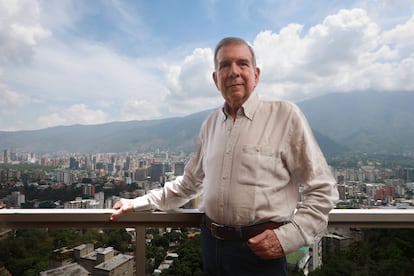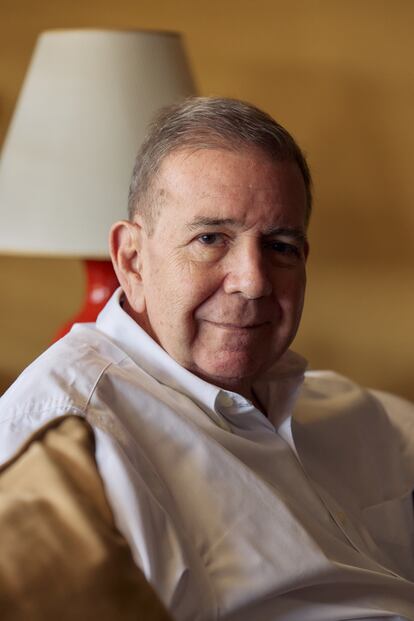Edmundo González Urrutia: ‘Our victory will force the government to negotiate’
Venezuela’s opposition presidential candidate is confident of his lead in the polls, but has reservations about President Maduro’s reaction if Chavismo loses the election on Sunday

The campaign command headquarters of Edmundo González Urrutia, as he himself explains, are located inside his home, a medium-sized apartment with an excellent view of Caracas on one of the hills surrounding the city. This is where the main opposition candidate in Venezuela’s presidential election works, organizes Zoom meetings, meets with the strategy team and talks with volunteers and journalists, helped by his wife and daughters.
His house is now guarded from a distance by members of the Bolivarian National Police, who nevertheless maintain a friendly attitude. The candidate himself says that he always stops to greet them when he goes in and out. The personal life of the until recently unknown 74-year-old diplomat has changed 180 degrees since he became a candidate, and he is now besieged by a whirlwind of crowds, obligations, rallies and demands of all kinds.
He says he has become accustomed to it. Citizens recognize him everywhere, and it is normal for them to whisper the same thing to María Corina Machado: that they are both their last hope, that they do not want to emigrate, that they want to see their children return to the country. Edmundo González Urrutia represents the option for change on Sunday, when he could end 25 consecutive years of Chavismo. The candidate of the ruling party, President Nicolás Maduro, is trying to put a stop to it.
Question. The president of the National Electoral Council (CNE) has accused the media of being financed by drug trafficking and of working with the opposition to reverse the election results. Attorney General Tarek William Saab says that if someone announces the result before the authorities do, they could go to jail. The President of the National Assembly, Jorge Rodríguez, also speaks of a plan by the opposition to claim election fraud as soon as the polls close. How do you view these statements?
Answer. Far from being guarantors of the institutions and of transparency, they act as political activists for the government. That would be unacceptable in other circumstances. They have lost all limits. We are seeing a president of the CNE who is practically campaigning politically in favor of the government. In 2006, Jorge Rodríguez left the CNE board to become vice president of the Republic. There is not the slightest modesty there.
Q. How have you felt, personally, during the election campaign?
A. I am not part of this world, I am not a politician nor am I interested in power, but I must say that I feel good, I have adapted. I have assumed my new role, the one that falls on me in this situation: to fulfill my personal commitment to the cause of democracy and the reconstruction of my country. To the reunion between Venezuelans. I like to talk about that, that this will be the government of reunion, of returning to the homeland, of embracing those who left.

Q. Do you feel ready to assume the presidency of the Republic in a context like this? You would be president-elect until January 10, 2025, when Maduro’s term ends; that’s a six-month transition.
A. Circumstances have put me here and I believe in destiny. I assume my responsibility with the greatest commitment. Furthermore, I am not alone, I am accompanied by much more than half of the country and, of course, by the leadership of María Corina Machado. All the opinion polls are giving us a comfortable lead, which does not make us feel triumphant. Now is the hard part. Negotiating with these gentlemen to achieve an orderly transition will be very difficult.
Q. Would the political and legal rights of these leaders be guaranteed — theoretically, if you assume power?
A. Of course. You have to consider what it must mean for these politicians to have international rewards of thousands of dollars for them. Are they going to hand over power if they lose? In any democratic country that is the normal thing to do, to lose and hand it over. They have revoked the invitation to Alberto Fernández, the former president of Argentina, just because he publicly raised the possibility that Nicolás Maduro might lose.
Q. And that doesn’t mean that they won’t hand over power to you if you wins the election?
A. No, what I mean to say is that these are expressions contrary to democratic, civilized conduct. In any country in the world, a transition is a routine procedure, it is not criminalized.
Q. What impression do you get of the mood of the population during your campaigning?
A. There is a lot of fervour and desperation. For example, I have not seen the so-called colectivos (civilian Chavista squads) anywhere during the campaign. At many checkpoints, police and military personnel wink at us and greet us when they can. It is very common. There is a lot of hope.
Q. Have you been mistreated by public officials?
A. It is rare. Once, a political commissioner from Conviasa, the state airline, verbally attacked and harassed me for taking that airline for a trip, supposedly for having requested sanctions. I did not reply so as not to be dragged into the provocation. It happens occasionally, but these are isolated incidents.
Q. How do you see Chavismo at this moment?
A. It is still a force, it exists, it is there. Very diminished, but it exists. I do not want to imagine that minority playing the role of the opposition with threats.
Q. Do you consider it inevitable that this will happen?
A. If the victory we obtain is of the magnitude we expect, a new reality will be produced here. Forced by circumstances, I think that Maduro will understand that he must hand over power, and that the best way is to do it in an orderly, democratic, decent way. In the event of defeat, liaison committees will be formed, contacts will be established.
Q. With so little time left to go before the election, do you think it is possible to come to power? Do you see it as viable?
A. I am a staunch democrat and I believe in the rules of democracy. Our adversary does not respect the rules of democracy. This is where the role of the international community and of certain figures can contribute to creating an environment favorable to a transition.
Q. Have you felt personally threatened?
A. No. There were occasional verbal attacks from Chavista citizens, nothing serious. We went to eat an arepa at La Encrucijada, after an event in Valencia, and some officials began to insult us, they were councilors. We had to leave. What I regret is that I couldn’t finish the arepa.
Q. Would your government initiate an aggressive ultra-liberal privatization program, like Javier Milei in Argentina, as some critics accuse you of planning?
A. No. Our plan is very clear, we have taken elements from María Corina’s government plan, Tierra de Gracia, but also from the 2019 Country Plan, and from other previous programmatic projects. It is a balanced, central project, with state presence.
P. Would you privatize the oil company Petróleos de Venezuela?
A. No. State-owned companies that are still operating will continue to operate. We will have to seek help to promote projects that have fallen behind, and the state does not have to be involved in everything, managing hotels or taxi lines. We need to increase the participation of the private sector.
Q. Have there been contacts, political messages, with sectors of the government or factions of Chavismo?
A. No, at least not on my side. For some time now, we have had Gerardo Blyde as our spokesperson for talks with the government, and some things have been done, but there is no formal dialogue mechanism.
Q. How do you see a transition in these circumstances, surrounded by a Chavista state?
A. I feel that the magnitude of our victory will open up a political reality that will force the government to negotiate. I really liked what Nicolás Maduro Guerra, the president’s son, said: whoever loses the election has to admit it.
Q. A message you want to send to Chavismo, to Nicolás Maduro at this time?
A. We have said it on several occasions: my government will be open to everyone. Adversaries will be respected, they will never be treated as enemies. There will be no persecution. We are moving towards reunion, towards reconciliation.
Sign up for our weekly newsletter to get more English-language news coverage from EL PAÍS USA Edition
Tu suscripción se está usando en otro dispositivo
¿Quieres añadir otro usuario a tu suscripción?
Si continúas leyendo en este dispositivo, no se podrá leer en el otro.
FlechaTu suscripción se está usando en otro dispositivo y solo puedes acceder a EL PAÍS desde un dispositivo a la vez.
Si quieres compartir tu cuenta, cambia tu suscripción a la modalidad Premium, así podrás añadir otro usuario. Cada uno accederá con su propia cuenta de email, lo que os permitirá personalizar vuestra experiencia en EL PAÍS.
¿Tienes una suscripción de empresa? Accede aquí para contratar más cuentas.
En el caso de no saber quién está usando tu cuenta, te recomendamos cambiar tu contraseña aquí.
Si decides continuar compartiendo tu cuenta, este mensaje se mostrará en tu dispositivo y en el de la otra persona que está usando tu cuenta de forma indefinida, afectando a tu experiencia de lectura. Puedes consultar aquí los términos y condiciones de la suscripción digital.








































